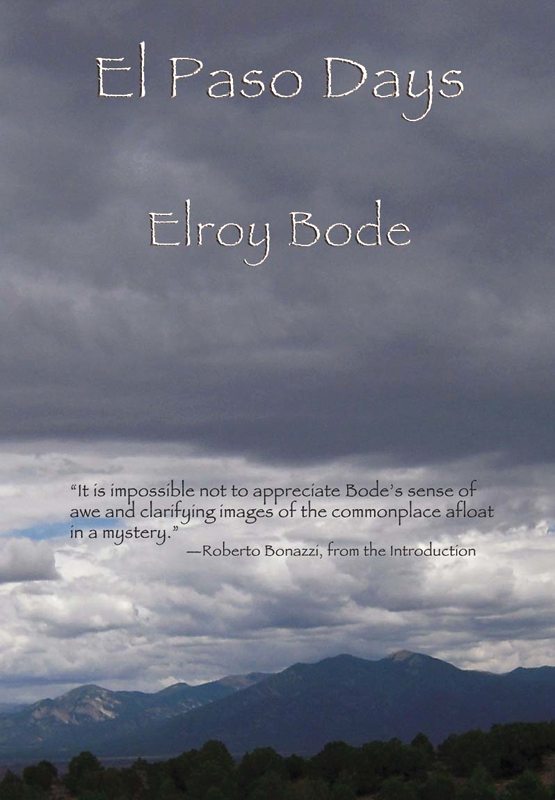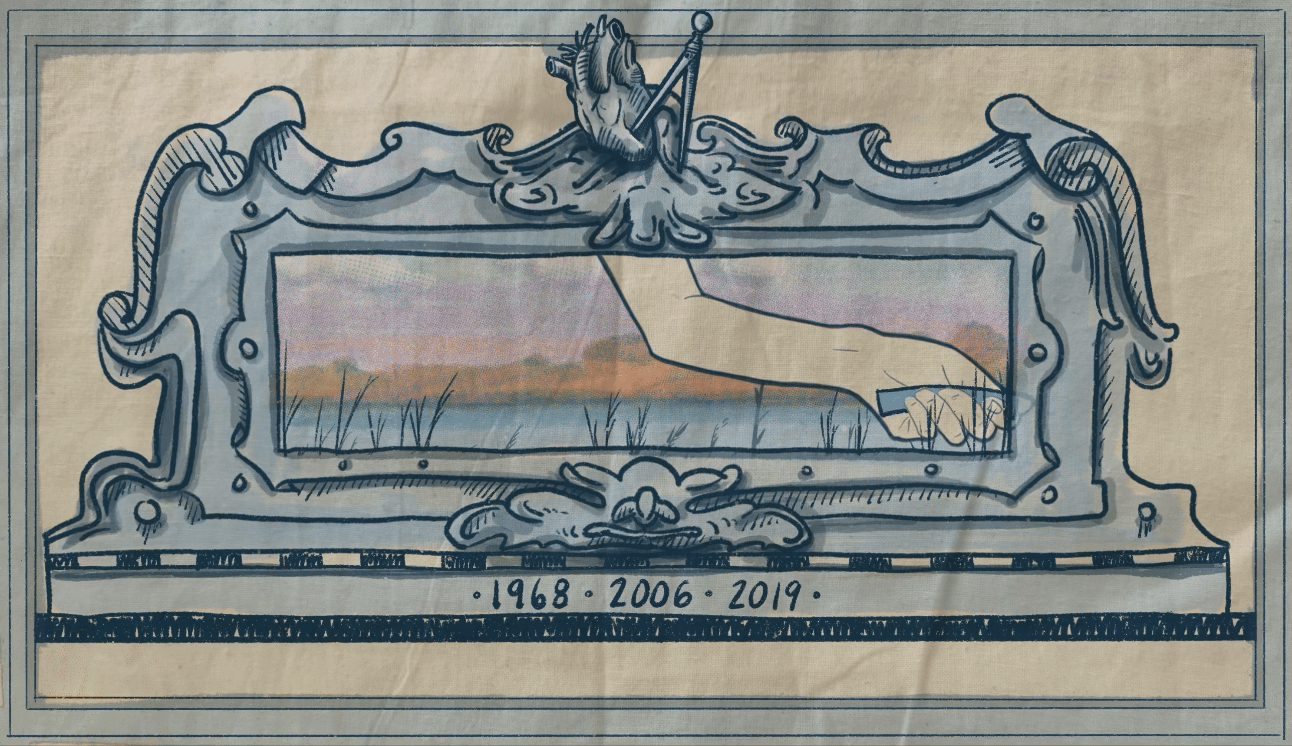
By Elroy Bode
Wings Press
160 pages; $16.00 (Wings Press)
In El Paso Days, Author Elroy Bode Finds Meaning in the Minutiae
A version of this story ran in the April 2014 issue.
Some months after my high school graduation, I stopped by my old school to see my sophomore English teacher, Mr. Bode. I had decided to put off college for a year and was unable to explain that decision to the satisfaction of my parents and teachers. When I entered Mr. Bode’s classroom, he sat down in a student desk with a lunchbox he’d likely been using for 30 years. I, a bit embarrassed, stood before him and said I was up to very little. He suggested that I was spending my time “be-ing” rather than “do-ing,” a perfectly noble activity as far as he was concerned, and his apparent respect for the choice made it seem noble to me too.
It was one of those moments that I’d later find in Bode’s books, occurrences that may not seem like much, but which hint at something important and lasting. That moment taught me something about my teacher that others had probably known for years. Elroy Bode didn’t need to hear that you were making piles of money or that you’d recently traveled to Paris. He was just as pleased to hear about you making dinner or taking a trip to the grocery store with your parents. He saw significance in such events, and he respected lives filled with their pedestrian ilk, even if others didn’t.
That respect defined his intertwined careers as writer and teacher. He was a beloved English teacher at El Paso’s Austin High School for decades, and the 1970 essay that won him statewide recognition grew directly out of his teaching. “Requiem for a WASP School” was a demand for respect for his students, written to combat the implicit racism and conservatism that saw danger in the gradual transformation of his school into one populated largely by working-class Mexican-American students. That essay won him his first award from the Texas Institute of Letters. He got his second in 1973 for the story of his discovery that Chicano writer Amado Muro was in fact a white man, Chester Seltzer, son of famed Ohio newsman Louis Seltzer. In addition to being a great detective story, “The Making of a Legend”—which was published in the March 30, 1973, issue of The Texas Observer, where Bode was a longtime contributing editor—is a great homenaje, the story of one man who lovingly adopted El Paso as his home, written by another.
Bode has now written nine books of careful observations and meditations about the people and places he has learned to respect. They are about not only El Paso but the surrounding areas of Texas and New Mexico where he traveled frequently and appreciatively. His writing returns especially often to the Hill Country where he grew up and where his father owned a feed store. In all his work he’s shown just what he told me in his classroom: that “be-ing” is no simple thing. To recognize the difficulties and the beauties and the hidden mysteries of the everyday was enough for a lifetime of thought, if not too much for one lifetime. “Everything is of value simply because it is—it exists in the magic of its own incomprehensible being,” he wrote in his “El Paso Journals, 1962-1966,” collected in 1997’s Home Country. “Bums, babies, trees, filling stations, grass—all exist, and thus all are worthy of your interest, reflection, and bewilderment.”
In his latest book, El Paso Days, Bode continues to share his appealing bewilderment. El Paso Days is a journal, or at least a journal of sorts. Elroy Bode’s mind wanders far too often, from past to present and from the visible to the invisible, to keep a regular journal of day-to-day life. El Paso Days is, rather, a collection of musings about life’s endless wonder and its occasional silliness, written by a man adept at mixing the personal with the philosophical,
the spiritual with the mundane, the observed with the remembered.
The friendly old man always telling stories is as much a character in this book as its author. One can’t help but be charmed by his descriptions of the collection of animals that he and his wife have built up in their backyard: dogs and cats and birds and turtles as impenetrable to understanding as any human. For instance, there’s the story—not fit for polite turtle society, one suspects—of how he and his wife found out which of their turtles were male and which female. And there is the story of his water-pistol defense against a rude bird named Sam: “This is what having too much time on your hands in retirement years can lead to: defending family honor and dining protocol by waging war against an arrogant, stubborn, bowlegged dove.”
But a deep sadness runs through this book. It comes, I think, from that same sense of mystery and meaning pervading—perhaps invading—all things. “The world is in my head, and I don’t know what to do with it,” he writes, as though feeling both the responsibility and the impossibility of facing life in its totality. Many people pursue freedom from the troubles of the world as their key to happiness, but for Bode such pleasures are elusive. “I don’t know if it is a matter of temperament, or a personality flaw, or just ordinary human awareness, but I cannot manage to keep the world at bay for any length of time. I whistle a tune—and, before long, images of Third World children with bloated bellies float before my eyes. My mind will not stay put. I cannot simply cultivate my own garden, enjoy my own spring, if I know that a bleak winter is covering the lives of others.”
But more than anything else, it is the past that intrudes. Bode, now 82, has announced that this will be his last book, and it fittingly contains his thoughts on his choice of career. “A school: Could there be a better place to spend one’s time and energy?” he asks, with earned satisfaction. Other memories are more painful, though. Observing a father and his son at a grocery store, “isolated within their father-son space,” he is reminded of the loss of his own son, Byron, whose tragic disappearance and death in 1999 is recounted in the book’s closing section. When Bode writes, “I would like to be the Dad of a Boy again,” one feels the sorrow in his yearning for the perfections and comforts of the simple and the ordinary that he has long encouraged others to appreciate.
Bode’s sadness stems also from his refusal to rely on religion or tradition for comfort, just as he has always declined to use them to comprehend and communicate significance. He refuses to base the value of his or anyone else’s life on the judgment of higher powers, choosing instead to understand life on its own unvarnished terms. Reflecting on the roots of his “daily despair,” Bode writes near the end of this book that, “Life has no meaning. It just is.”
This book gives readers no cause to despair, though. Lack of larger meaning can be countered by remembering the magic behind that last “is”—behind life’s “be-ing”—that Bode’s work celebrates. Life may be no more or less meaningless than a piece of music we don’t understand, but both have the power to fill us with overwhelming emotion. Life is encountered in backyards, conversations overheard in grocery stores, meetings with old friends, trips to familiar places—moments we may not understand but can’t forget. El Paso Days has its share of sorrows, but, more important, it is full of life. With all of the honesty and directness that Bode has always brought to his work, it communicates the sense that the world is out there for us, alive with meaning.
To support journalism like this, donate to the Texas Observer.

